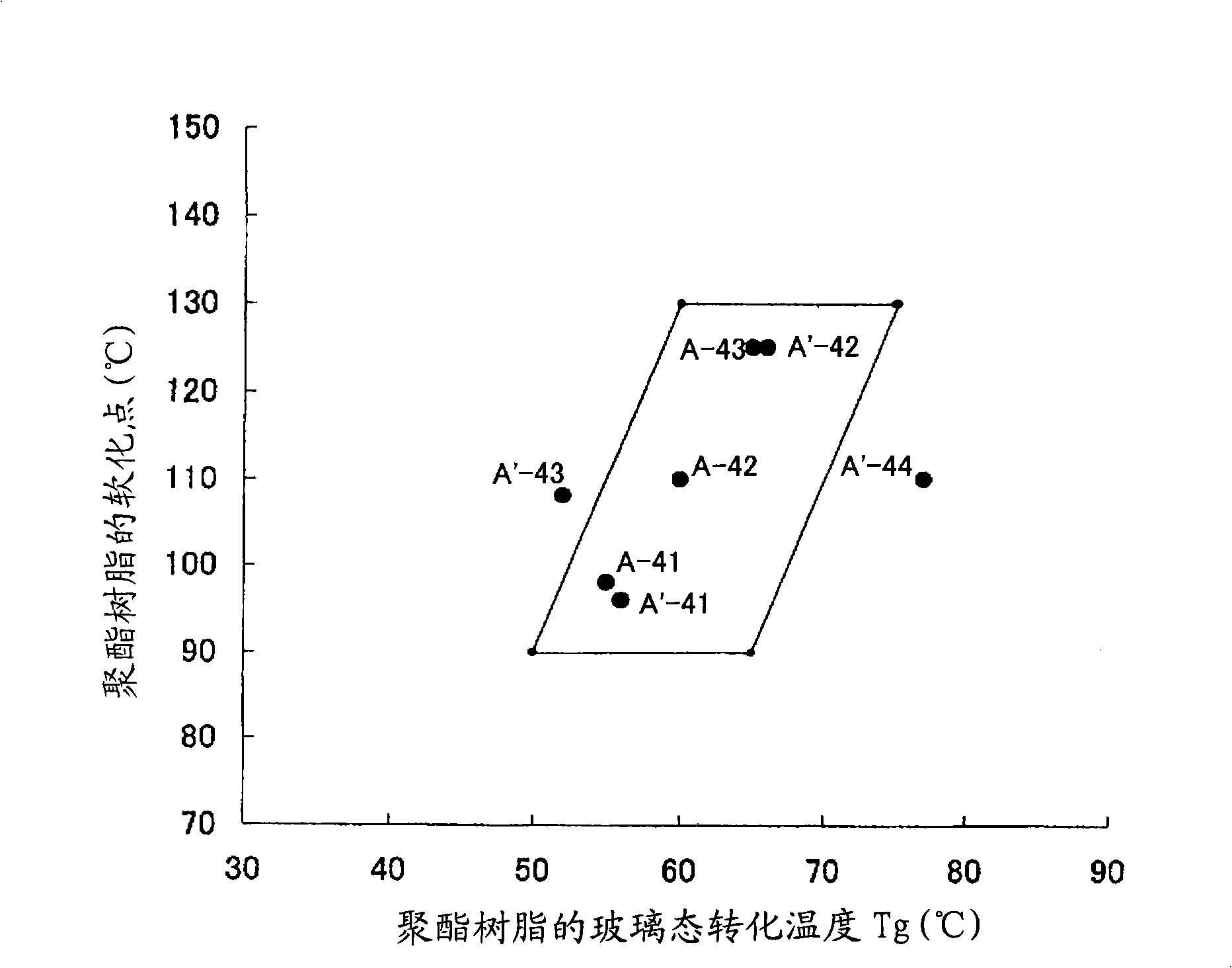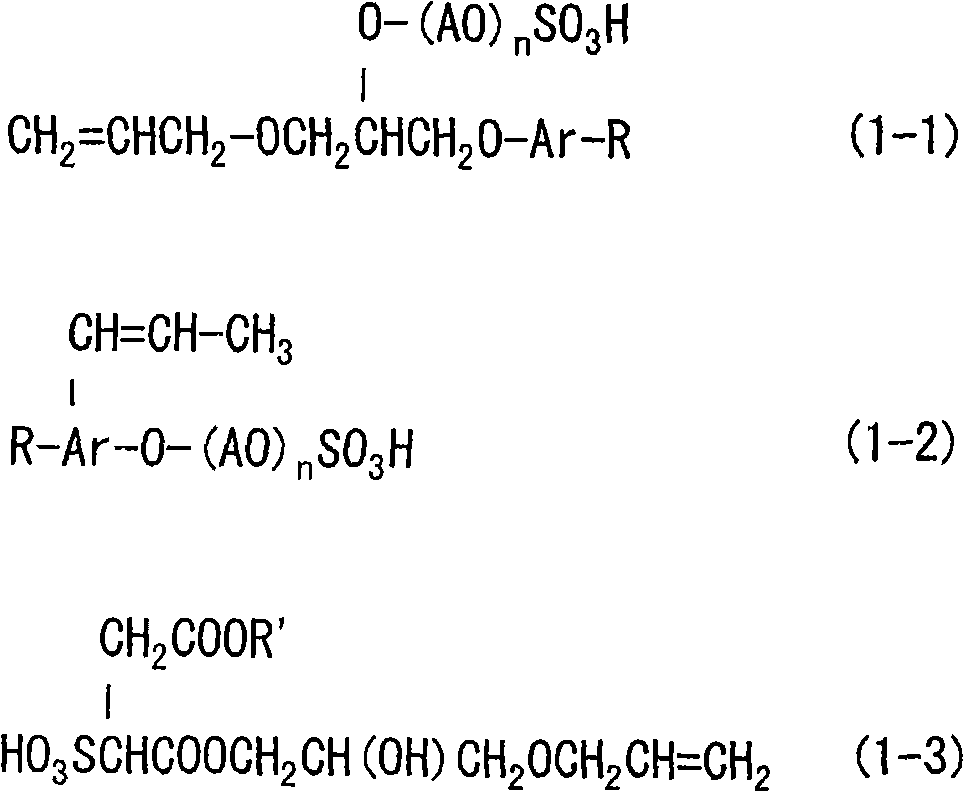Resin particle
A technology of resin particles and resin particles, which is applied in the field of toner resin and toner composition, can solve problems such as insufficient low-temperature fixing characteristics, and achieve excellent storage stability, low cost, and excellent anti-blocking properties Effect
- Summary
- Abstract
- Description
- Claims
- Application Information
AI Technical Summary
Problems solved by technology
Method used
Image
Examples
preparation example Construction
[0467] The method for producing the resin fine particles (Q) is not particularly limited, and for example, methods [1] to [8] exemplified below can be used. Methods [1] to [8] are methods for obtaining an aqueous dispersion of resin particles (Q), wherein the aqueous dispersion of resin particles (Q) can be directly used to prepare composite resin particles of the present invention, or resin particles (Q) It may be isolated from the aqueous dispersion alone, or the resin fine particles (Q) may be isolated during the preparation of the aqueous dispersion. The separation method can adopt filtration method, decantation method and centrifugation method.
[0468] [1] In the case of vinyl resins: use the monomer as the starting material, and in the presence of a polymerization catalyst, carry out polymerization reaction by suspension polymerization, emulsion polymerization, seed polymerization or dispersion polymerization, etc., to directly prepare resin particles Aqueous dispersio...
Embodiment 1
[0544] [Synthesis of linear polyester]
[0545] In the reaction tank equipped with cooling pipe, stirrer and nitrogen inlet pipe, add 639 parts (24.5 moles) of 1,2-propanediol (hereinafter referred to as propylene glycol), 180 parts (1.6 moles) of bisphenol A 2 Moles of ethylene oxide (EO) adduct, 653 parts (9.8 moles) of dimethyl terephthalate, 10 parts (0.2 moles) of adipic acid, and 3 parts of tetrabutoxytitanic acid as condensation catalyst ester, the reaction was carried out at 180°C for 8 hours in a stream of nitrogen while removing the methanol produced. Then the reaction system was gradually heated up to 230°C, reacted in a nitrogen stream for 4 hours, while removing the produced propylene glycol and water, and further reduced the pressure to 5-20mmHg for the reaction, and the product was taken out when the softening point reached 90°C. The recovered propylene glycol was 263 parts (10.1 moles). After cooling the taken out resin to room temperature, it was pulverized ...
Embodiment 2
[0555] [Synthesis of linear polyester]
[0556] In the same reaction tank as in Example 1, 720 parts (23.8 moles) of propylene glycol, 735 parts (9.8 moles) of dimethyl terephthalate, 29 parts (0.5 moles) of adipic acid, 3 parts of tetrabutoxy base titanate, the reaction conditions are the same as those for synthesizing linear polyester (Aa-1) in Example 1 above, and the product is taken out when the softening point reaches 94°C. The recovered propylene glycol was 235 parts (7.8 moles). After cooling the taken out resin to room temperature, it was pulverized into pellets. The product obtained was a linear polyester (Aa-2).
[0557] The Mn of the linear polyester (Aa-2) is 2700, the Mp is 5800, the content of components with a molecular weight of 500 or less is 2.0%, the THF insoluble part is 0%, En is 73KJ, G' is 300, and Tm is 90 °C, tanδ is 5-11.
[0558] [Synthesis of non-linear polyester]
[0559] In the same reaction tank as in Example 1, 663 parts (22.5 moles) of pr...
PUM
 Login to View More
Login to View More Abstract
Description
Claims
Application Information
 Login to View More
Login to View More - R&D
- Intellectual Property
- Life Sciences
- Materials
- Tech Scout
- Unparalleled Data Quality
- Higher Quality Content
- 60% Fewer Hallucinations
Browse by: Latest US Patents, China's latest patents, Technical Efficacy Thesaurus, Application Domain, Technology Topic, Popular Technical Reports.
© 2025 PatSnap. All rights reserved.Legal|Privacy policy|Modern Slavery Act Transparency Statement|Sitemap|About US| Contact US: help@patsnap.com


